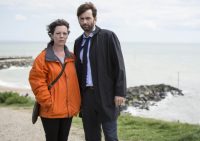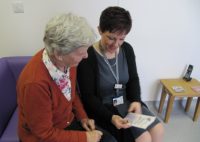Broadchurch isn’t just a TV programme – what happened to Trish is very real

Olivia Colman as DS Ellie Miller and David Tennant as DI Alec Hardy in Broadchurch.
When one of the suspects in ITV’s crime drama, Broadchurch, says of the rape victim, “She’s not the sort of woman this happens to”, you can almost feel the hackles going up on the backs of crisis workers across the country. Because Trish Winterman, the character in question, is exactly the sort of woman rape happens to. Not because she’s young and pretty, walking home late at night, drunk, in a tiny skirt.
In fact, she’s none of those things. Trish is a middle-aged mother who works in a garden centre. But on the night of her best friend’s 50th birthday party, she finds herself vulnerable and accessible, and those are the two things crisis worker, Lynn Ambrose, tells me rapists look for in a potential victim.
Rape isn’t motivated by sexual desire. As Broadchurch’s DS Miller says of Trish’s attack, “it was about power and control, not sex”. Ninety per cent of rape victims know their attacker and as television programmes like Broadchurch and the BBC’s Apple Tree Yard seek to highlight, rapists strike at birthday parties, office parties, outside smart wine bars, even in the marital bed.
For this reason, as I toured a Sexual Assault Referral Centre in Ipswich recently, called The Ferns, I made a conscious effort to remind myself that what I was looking round was a resource, funded by Suffolk Police and the NHS, for use by me; by me, by my friends, by any woman, man or child who, heaven forbid, is raped or sexually assaulted.
A SARC is the building Trish is taken to in Broadchurch to be examined. In her case, she is escorted by two police officers, having reported the rape to the police herself. However, in real life there is also the option of calling
SARCs directly and by-passing the police altogether. Forensic evidence can be stored at the centre for up to seven years, so there is no immediate pressure on a victim to report the assault.
In fact, one of the main reasons SARCs, like The Ferns, exist is to give women time and options, without a police officer in sight. There is a relatively short forensic window after an attack though so a key job for crisis workers is to encourage victims to come to The Ferns as soon as they can, even if only to have a cup of tea and take the morning-after pill.
When you arrive at The Ferns you are at the start of what the staff call the ‘victim’s journey’. You move from room to room and exit via a different door, never turning back.
That way, as Lynn Ambrose, who manages the centre, explains, “you are physically moving forward and hopefully psychologically too”.

Workers at The Ferns sexual assault referral centre in Ipswich.
The process starts in the waiting room, where victims are met by crisis workers. Any accompanying police officers disappear at this point. All involved then change into scrubs and once the victim has given his or her consent a forensic nurse begins the process of taking swabs and documenting injuries. After a shower, fresh towels and new clothes, the individual moves on to the recovery room to discuss the relevant next steps: refuge availability, counselling services, what to expect from a police investigation or court process. Victims are also assigned Independent Sexual Violence Advisers, for eight weeks at the very least. Once back in the outside world, recovery can be hampered by the constant need to explain what’s happened to the likes of one’s GP, boss or child’s school, so ISVAs step in to be a victim’s voice and do all the talking for them.

Children’s Room at The Ferns
The Ferns is Suffolk’s only SARC and thanks to an associated charity, The Friends of the Ferns, it is able to offer a number of services that aren’t available in other counties. Victims have the use of a videolink room, so that
they can give evidence in court without having to face the courtroom in person. There is also a children’s room full of toys and a three-dimensional distraction system to minimise distress during examinations. Since The Ferns
opened in April 2011, the centre has helped 397 people under the age of 19.
Unlike Trish Winterman in Broadchurch, the rape victim in Apple Tree Yard chooses not to go to the police. Yvonne Carmichael, an eminent scientist, wife and soon-to-be grandmother, is seen driving as far as the police station
only to lose her resolve at the last minute. And that is the norm: 85% of victims do not report their attack. At The Ferns, 22 adult victims walk through their door each month on average, a number which could be higher if more
chose to speak out.
The Ferns has a 24 hour helpline: 0300 123 5058.
To make a donation, contact friendsoftheferns@safecic.co.uk
newsroom@archant.co.uk
Leave a Reply
You must be logged in to post a comment.